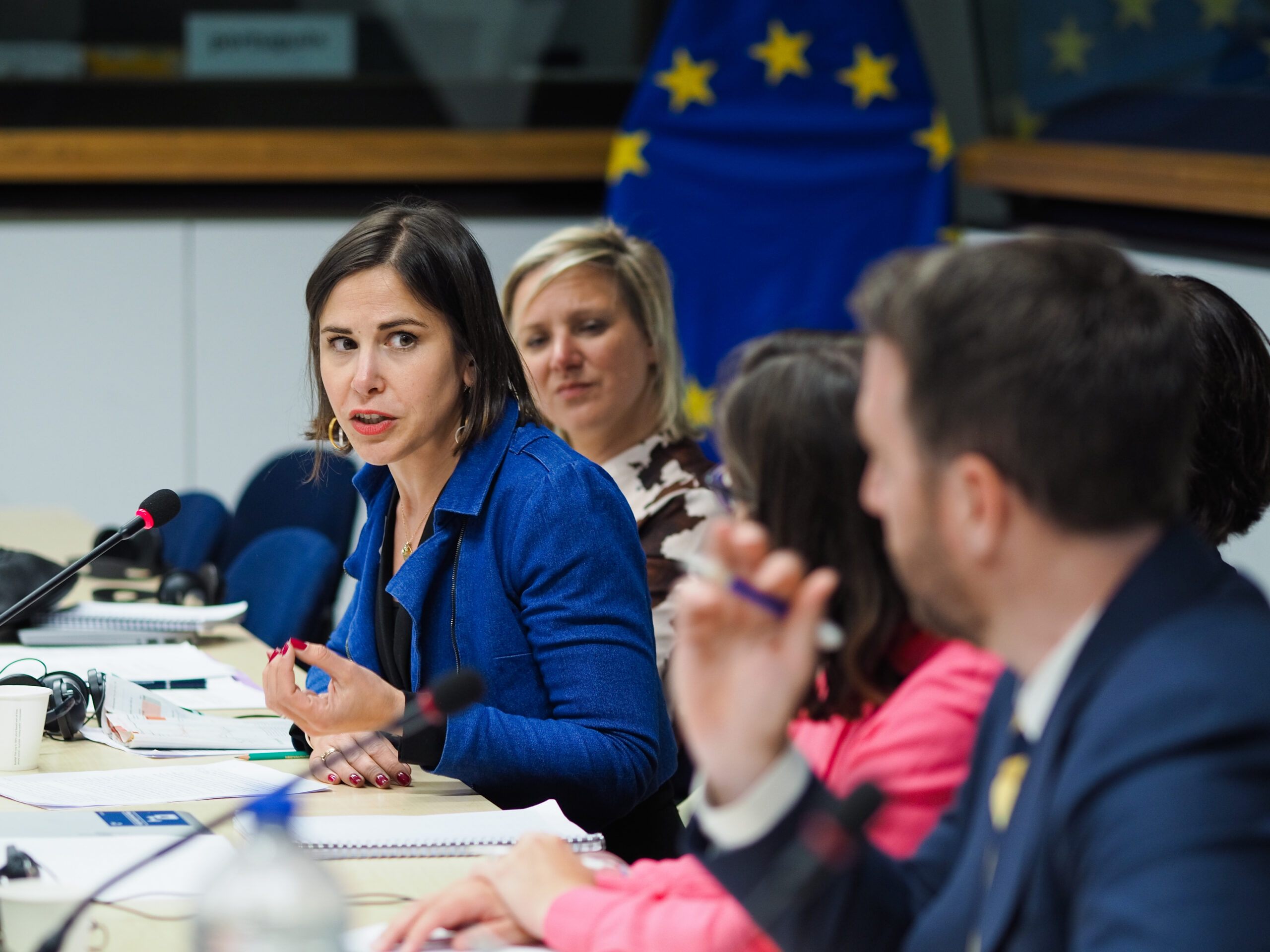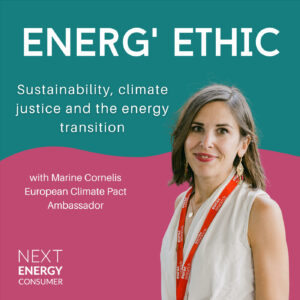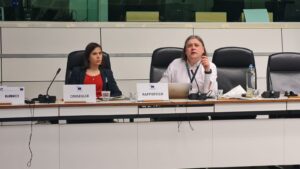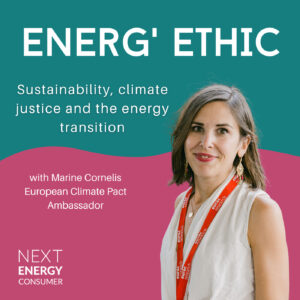CEER 2023 Customer Conference focused on “Avenues for the Green and Digital Transition: Enabling energy consumers as agents and beneficiaries” (16 May 2023). The expert discussion highlighted the pressing need for consumer engagement in the transition towards a carbon-neutral and just energy system, while also ensuring energy security and meeting climate goals.
As one of the key high-level speakers in session 1: “Customer engagement – lessons from the energy crisis in a digital era”, Next Energy Consumer Executive Director Marine Cornelis underpinned the urgent need to balance social and environmental emergencies while ensuring consumer protection, energy security, and access to affordable and sustainable energy. She shared valuable knowledge on combating energy poverty, embracing digital tools, and empowering consumers in the global shift towards a carbon-neutral future. Her full speech is available below.
We are witnessing a paradigm shift worldwide, with two apparently contradictory forces at stake. On the one hand,it is no longer socially acceptable not to have access to modern energy, or to have one’s energy cut off for non-payment. But this doesn’t happen in a vacuum. On the other hand, climate change, energy crisis, and more extreme weather events such as heat waves, that are incredibly frequent worldwide, make the possibility of general blackouts more and more likely. Therefore, policymakers and regulators must roll up their sleeves to build new ecosystems that guarantee the right to energy while balancing social and environmental emergencies.
As we all know, since 2021, consumers have been constrained to change their habits and reduce their energy consumption, we can applaud this collective effort, but throughout Europe, many have had to sacrifice their comfort. Yesterday, I read an article from the Economist that had high energy prices last winter had claimed Europe 68,000 excess deaths. It should never happen again! We can read many testimonies on local newspapers, but aggregated Eurostat data on winter and summer energy poverty is not yet available. It is urgent to understand how energy poverty has evolved and whether new categories of individuals, especially the middle classes who used to be shielded, have now to deal with it. Are there 35 or closer to 100 million people facing energy poverty now in Europe? Worldwide, 759 million people still have no electricity. It is about the US and EU populations taken together. Most of these people live in Africa. Half of the African continent has no access. The other half suffers from a chronic deficit in the quality supplied. The electricity they get is insufficient to meet their needs to access health care, store and cook food, level up their education, work, and move around. Women, children, minorities, and indigenous groups are the most vulnerable.
Until a couple of years ago, the right to energy was guaranteed by the illusion of the security of supply on an international scene. But now, high prices and sacrifices kill, they do compromise universal access to energy. This is unfair.
Besides, complaints about disconnections and bad commercial practices have soared. People are concerned! Many states and regions have introduced (Catalonia) or are considering (France) bans on energy disconnection for non-payment. – Let’ have a proper right to energy globally, as there is a right to water! As a European response, as proposed in Article 28 of the recast market design directive, it should be translated in a ban on disconnection for non-payment enshrined in the directives.
At the same time, increasingly violent weather patterns and hotter summers are raising new questions about the continent’s resilience to climate change. Here again, there’s a lot to learn from developing countries. Global warming means more people will use air conditioning, and as we know, they’re not the most efficient appliance! Peak consumption could shift to Summer, as in the southern Mediterranean countries. This will require profound changes in regulation, network balancing, and people’s habits. Whether you have solar panels or not or are part of an energy community, people will have to learn to use electricity when it is available in abundance but also to restrict themselves sometimes, at the risk of general blackouts.
But to counter this, people must accept new tools. Dynamic tariffs are an example. Digital tools are another. For example, some digital tools can aggregate data, monitor remotely, and carry out micro-interventions to avoid general blackouts. But top-down processes hardly empower everyday people and make consensus overnight. The social acceptance part, as we know, can be extremely delicate. In EURICA, the flexibility project I’m working on in Madagascar and Burkina Faso, households don’t want to hear the tech provider can “control” their consumption but would accept for it to be “monitored”. The nuance is important. What made the difference are one-to-one conversations, explaining in details the relevance of such schemes. Smart homes, and smart devices are at the risk of facing their own version of “not in my backyard” – they’re facing “not in my pantry”, as they’re really in people’s homes. And this is particularly true if they have a bad experience with a smart device, like a smart meter which doesn’t deliver on its promise to give accurate and timely bills.
We must ask then: what are the guarantees for everyday people, and how are those stakeholders liable? We’re navigating a grey zone between digital or telecommunication and energy regulations. The providers of these services are increasingly global, more integrated, and more complex to understand. And this has consequences for the way these services work, their readability and reliability. For instance, their design does not always often miss to include the most vulnerable or aren’t even well adapted to human needs. We might not be there yet, but I recommend reading about the smart city of Songdu, Korea, as a missed opportunity.
Indeed, demand-side flexibility and voluntarily reducing consumption at crucial times are becoming indispensable in a survival strategy that guarantees a high-quality energy supply for all. It is the only way to go forward and make social progress, while maintaining our living models and keep our lives comfortable – and we know not everyone is living comfortably.
In practice, we must learn how to do better with less, and the principles of energy sufficiency must be at work.
Specifically on digitalisation, if we use an energy or climate justice lens, if we use a global lens, we must ask: who’s going to be vulnerable? Who’s going to benefit? Digitalisation tools and, overall, the energy transition must be instruments to level the playing field, not create further gaps and create inequalities. It shouldn’t only work for people who are already wealthy, who can already afford it. We must make sure those benefits trickle down to everyone.
For this tech transition to be a just transition, we must always keep the people, with all their complexity, at thecentre, focusing on improving the quality of life, and maintaining comfort. This supposes co-constructing solutions with the people, civil society organisations, ombudsmen, and researchers. Otherwise, we open the way to climate denialists, fake news, greenwashing, and delays in action. Regulators’ role is to create the foundations of trust so that every party can serve society and deliver for the people. They must facilitate access to information to avoid misinformation and delay in action. People want to be treated as equals. After all, there is no such thing as energy consumers: we are all consumers with rights.





